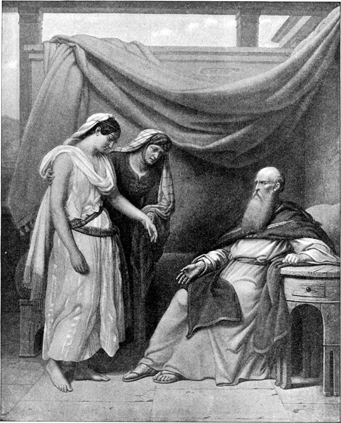The views expressed in our content reflect individual perspectives and do not represent the authoritative views of the Baha'i Faith.
It takes two to speak the truth—one to speak and another to hear. – Henry David Thoreau
The next part of Genesis—Chapter 16—opens with the news that “Sarai, Abram’s wife, had borne him no children.” Because Sarah has been barren since the beginning of her marriage, and because—as scripture suggests—Abraham needs children to continue the line of inheritance, she approaches him with a suggestion:
Behold, Behold now, the lord hath restrained me from bearing: I pray thee, go in unto my maid; it may be that I may obtain children by her.

Abraham, Sarah and Hagar
Sarah makes this generous offer because it was the custom—perhaps even the law—that a wife who couldn’t produce children was obligated to find a second wife with whom the husband could try to beget children. When the baby was born, it would become the adopted child of the first wife and, if male, would become her husband’s heir. And that is how Hagar, the Egyptian, who was perhaps the daughter of a pharaoh, found herself in the position of assuming wifely duties in regard to Abraham.
No one has recorded Hagar’s reaction to being pushed into the position of becoming a mother, but Abraham agrees to the arrangement. Conception takes place on—tradition says—the very first night, and over the next several months, Genesis outlines a drama worthy of the most imaginative soap opera. As soon as Hagar is sure she’s pregnant, she becomes contemptuous of Sarah and behaves badly toward her.
What did Hagar do? Scripture is mute, but Jewish sources give this account: Hagar is having a difficult time with her pregnancy, and Sarah is concerned. So, when friends stop by to visit Sarah, she asks them to visit Hagar, too. Hagar, rather than being grateful to Sarah for the extra attention, begins denigrating her. She is even bold enough to suggest that Sarah’s barren condition is due to her lack of spirituality:
My lady Sarah is not inwardly what she appears to be outwardly. She makes the impression of a righteous, pious woman, but she is not, for if she were, how could her childlessness be explained after so many years of marriage, while I became pregnant at once? – Ginzburg, The Legends of the Jews, p. 238.
Whether due to backbiting or something else, the unpleasantness between Sarah and Hagar becomes so annoying that Sarah complains to Abraham. He refuses to take sides, replying that because Sarah is the mistress of the household, she has the right to do what she pleases with her servant.
The upshot, Genesis reports, is that Sarah deals harshly with Hagar. What does this mean? What did she do? Historical evidence indicates that if a wife gave a servant to her husband as a concubine, and if this servant subsequently claimed equality with her mistress because she bore children, the mistress could exact retribution by demoting the woman to her former station as servant. Plus, if the concubine spoke insolently to her mistress, her mouth could be scrubbed out with a quart of salt.
Tradition paints an even more vivid picture: Sarah removes a slipper, slaps Hagar with it, and then forbids Hagar to sleep with Abraham any longer.
In considering the animosity between the wives, should we presume that none of this happened literally? Is the antagonism sketched out in Genesis between wife and concubine not really about the women of four thousand years ago, but primarily a sad prophecy of the attitudes that many of the descendants of Abraham will have toward one another?
















Comments
Sign in or create an account
Continue with Googleor